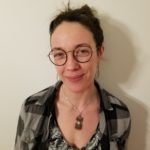Notables - October 3, 2018
Rebecca MelvilleOctober 3, 2018
By Craig Bamford
MaRS produces new report on diversity and belonging in workplace
Welcome to Notables for October 3rd, 2018. This week: a set of surprisingly-linked stories about scientific research.
First this week: A new report on bringing more diversity into research in Toronto.
MaRS Discovery District has produced a new report about diversity in science and research; where it's improved, where it may need changing, and what can be done to change it. In particular, they looked at "diversity, inclusion, and belonging"; the often-unseen and underappreciated barriers that can cause women, people with disabilities, people from the LGBTQ+ community, and others from marginalized backgrounds to feel like they don't truly belong in the workplace, and don't feel fully included. This is cited as one of the reasons that women are still underrepresented in tech occupations.
(Often, these exclusions appear in unexpected ways: one story was about how coworkers' family cottages made the respondent feel that their own class background created an impassable barrier.)
What they found in many cases is that employers want to change this, but "don't know how or where to start". They recognize that members of marginalized groups will enrich their organizations, but are confused and often fearful of "doing the wrong thing". They are implementing diversity initiatives, which are having some positive effects, but more needs to be done to ensure that inclusion extends past the hiring stage.
University of Waterloo researchers fixing "cybersickness"
Next this week: The University of Waterloo is working to "fix" Virtual Reality.
Last week, researchers at the University of Waterloo announced that they may have a solution for VR-based motion sickness, or "cybersickness". The nausea and discomfort for "cybersickness" is a well-known barrier for adoption of virtual reality, despite the immense promise of VR both as an entertainment medium and a specialized workplace tool.
Researchers at the University's Department of Kinesiology discovered that part of the reason is "differences in how individuals use vision to control their balance". They studied sensorimotor measures from 30 individuals, and paired it with information about their reactions to a zero-gravity VR space simulator. From that, they created a model that can predict how people will react to VR, and customize the experience to reduce or even prevent the onset of cybersickness. Michal Barnett-Cowan, Kinesiology neuroscience professor, said that "Considering this technology is in a growth phase with industries such as gaming, design, medicine and automotive starting to use it, understanding who is negatively impacted and how to help them is crucial."
Canada's Professor Donna Strickland wins Nobel Prize in Physics
Finally this week: Waterloo's Prof. Donna Strickland is the third woman to win the Nobel Prize in Physics!
The University of Waterloo's Physic Professor Donna Strickland was announced on Tuesday as one of three recipients of the 2018 Nobel Prize in Physics. Professor Strickland is the first Canadian woman to win the Prize since 1963's Maria Goeppert-Mayer, and the third woman ever to win the Prize - demonstrating how far we still need to go on, as MaRS also revealed this week, on bringing women and other marginalized communities into scientific research.
The Prize was for groundbreaking work on lasers done by Strickland, France's Gerard Mourou, and Bell Laboratory's Arthur Ashkin. Ashkin developed "optical tweezers" that allows lasers to "grab" and move particles, atoms, and even living cells; while Strickland and Mourou were responsible for the "chirped-pulse amplification" that creates the high-intensity laser pulses used in now-commonplace laser-based corrective eye surgeries, as well as a wide variety of other research and industrial applications.
Prof. Strickland said in a statement that "We need to celebrate women physicists because they're out there... I'm honoured to be one of those women".
Notables is a weekly collection of interesting science, technology, investment and innovation reports, press releases and other news bytes from around the web. Notables are curated and written by Craig Bamford.
Have a report or press release you want to share? Let us know!
The views and opinions expressed in this piece are solely those of the author and do not necessarily reflect those of RE$EARCH MONEY.
Events For Leaders in
Science, Tech, Innovation, and Policy
Discuss and learn from those in the know at our virtual and in-person events.
See Upcoming Events
By using this website, you agree to our use of cookies. We use cookies to provide you with a great experience and to help our website run effectively in accordance with our Privacy Policy and Terms of Service.




